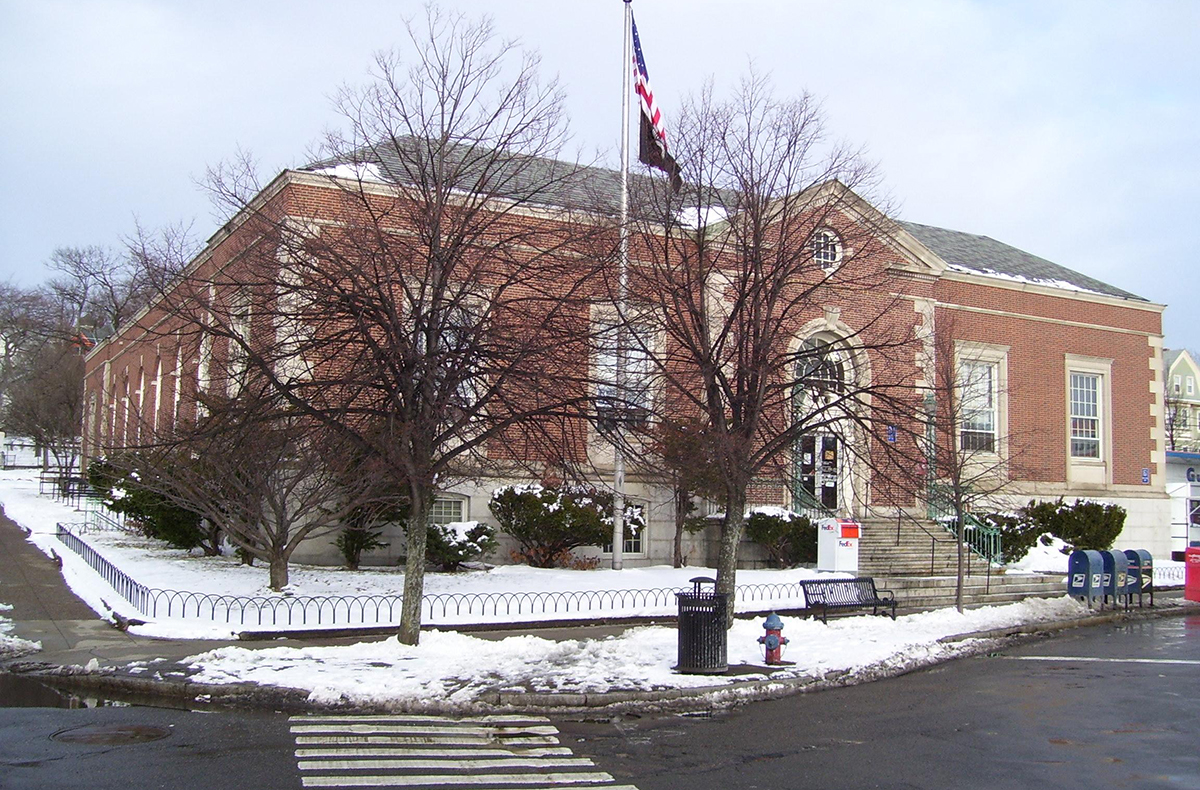Historic Somerville Post Office Could Become Arts and Food Space

Post Office Photo Uploaded by Swampyank on WikimediaCommons
Somerville’s historic Post Office in Union Square, which closed its doors due to budgeting issues, has been scooped up by an investment firm that represents one of the area’s most well-known supporters of live music and entertainment.
According to a press release sent out by Somerville officials on Thursday, the U.S. Postal Service completed the $2.7 million sale of the building on Washington St., which directly abuts the main center of the Union Square neighborhood, to Cambridge-based Union Square Partners LLC, an investor group associated with arts and entertainment promoter Don Law.
The city notes that at this time there is “no formal proposal” for the building space, but the firm is looking into possibly transforming it into a hybrid-venue that could include a nook for the arts, a café, or even a restaurant. The buyer has also agreed to work with the Somerville Arts Council to talk about sectioning off additional areas within the building for community use connected to increasing the performing and visual arts sector.
“The arts are both central to the character of Union Square and an economic driver in the city, so this is welcome news, certainly in light of some of the recent proposals for the re-use of the building.,” said Mayor Joe Curtatone in a statement. “It also dovetails with the clear consensus to promote the arts that has emerged from our community processes. Bringing live arts to this landmark building would help us move toward this shared goal, and our public processes going forward will help ensure that we do so in a way that reflects resident priorities.”
Based on Law’s track record as one of the biggest promoters of the Boston music scene—he is behind live performance spaces like the House of Blues and the Brighton Music Hall — the possibilities of what could go into the building seem promising to advocates of the changing face of Union Square.
During the summer, after a city-appointed committee bounced around the country meeting with potential master developers, Curtatone announced that Union Square Station Associates was unanimously picked to take on the Union Square Revitalization plan.
Officials from Somerville said the investment firm’s initial inclination to open a venue dedicated to community engagement falls in line with that plan, which aims to “specifically encourage an arts-related use in the Post Office building.”
The sale also jives with the ambitions of a local community group that hosted a series of meetings with developers, designers, neighbors, and elected officials to discuss ways to bolster the arts scene in Union Square as it prepares for the complete overhaul.
“As a group, we haven’t really discussed it, but we have taken the position that preserving the building for some type of public function was important, and that public access be preserved in the lobby and the mural in the lobby,” said Tim Tulan, chairman of the Union Square Neighbors group, an independent, grass-roots organization keeping an eye on the pending developmental changes. “Having it for an arts-related use is what we wanted.”
Tulan said he hopes that maybe the new property owner will follow in the footsteps of places like the Somerville Armory, home to an amalgamation of rotating workshops, concerts, and art galleries that bring the community together.
“I know this city for awhile was hoping to see a performing arts theater, and that seemed like a wonderful idea, but a music venue could be great—something that’s hopefully that is more flexible, making it a whole variety of things,” Tulan said.
Tulan said the idea of an arts café, music venue, or even theater space in Union Square “all sound great.”
“To the greatest extent possible it would hopefully be a place that—the post office was a place everyone went to at some time or another, it was a true civic building, and a building with an arts-related use can be that as well,” he said. “It certainly seems like a pretty promising development.”


